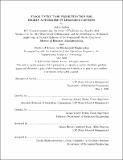Floor entry task prioritization for highly automated fulfillment centers
Author(s)
Amlani, Ankur.
Download1191619212-MIT.pdf (5.669Mb)
Other Contributors
Sloan School of Management.
Massachusetts Institute of Technology. Department of Mechanical Engineering.
Leaders for Global Operations Program.
Advisor
Yanchong (Karen) Zheng and Kamal Youcef-Toumi.
Terms of use
Metadata
Show full item recordAbstract
As automation continues to gain prevalence within the retail industry, informed decision-making by users of robotic systems is critical for management of throughput and operating expenditures. On robotic fulfillment floors, obstructions such as fallen product and deactivated robots can degrade robotic floor throughput by blocking access to product, forcing robots to re-route, and increasing worker idle time. Workers can walk onto the floor to address obstructions during operation, but such entry affects robot movement and can undermine the original intention of restoring throughput. This project aims to provide insight into the cost-benefit tradeoff of resolving obstructions to enable task prioritization and reduce unnecessary floor entry during operation, thereby improving system performance and reducing operating costs. We introduce a novel framework for modeling floor entry to determine the "value" of resolving an obstruction and apply an agile approach to rapidly develop and pilot a software tool for delivery of model recommendations in the field. During the treatment shifts, z-scores of measured pick work unavailability (our chosen performance metric, for which a reduction is indicative of improved throughput), were -0.72, -1.04, and -0.16 as compared with a control sample of similar shifts. The approximate fraction of obstructions resolved during non-operation increased by a factor of three, with recommendation adherence measurements indicating that the increase was driven by elimination of unnecessary (as determined by the model) floor entries during operation. While the sample size was not large enough to achieve a statistically significant outcome, these results offer useful insights regarding future analytical work, testing, and associated organizational changes.
Description
Thesis: M.B.A., Massachusetts Institute of Technology, Sloan School of Management, in conjunction with the Leaders for Global Operations Program at MIT, May, 2020 Thesis: S.M., Massachusetts Institute of Technology, Department of Mechanical Engineering, in conjunction with the Leaders for Global Operations Program at MIT, May, 2020 7102 Sloan School of Management. Cataloged from the official PDF of thesis. Includes bibliographical references (pages 103-106).
Date issued
2020Department
Sloan School of Management; Massachusetts Institute of Technology. Department of Mechanical Engineering; Leaders for Global Operations ProgramPublisher
Massachusetts Institute of Technology
Keywords
Sloan School of Management., Mechanical Engineering., Leaders for Global Operations Program.